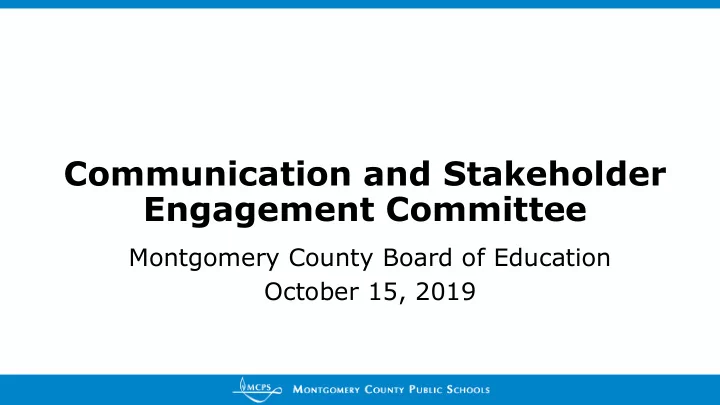

Communication and Stakeholder Engagement Committee Montgomery County Board of Education October 15, 2019
Connecting for Student Success: All Means All Division of Student, Family, and School Services Office of Student and Family Support and Engagement October 15, 2019
Family Engagement Core Beliefs Core Belief 1 All parents have dreams for their children and want the best for them. Core Belief 2 All parents have the capacity to support their children’s learning. Core Belief 3 Parents and school staff should be equal partners. Core Belief 4 The responsibility for building partnerships between home and school rests primarily with school staff.
MCPS Strategic Priorities • REMOVE cultural or linguistic barriers that may prevent families from engaging with their children’s education in partnership with the school. • FACILITATE TWO-WAY COMMUNICATION with parents, students, employees and community members using an array of tools to engage and communicate information.
MCPS Family Engagement Standards • Welcoming All Families • Communicating Effectively • Supporting Student Success • Speaking Up for Children • Sharing Power • Collaborating with the Community ( MCPS Policy ABC, MSDE Pre-K – 12 Family Engagement Framework and PTA Standards) Policy ABC Regulation ABC-RA
The Research – Benefits of Family Engagement When families and schools partner, students: • Attend school regularly. • Earn higher grades and test scores. • Have better social skills. • Show improved behavior. • Graduate from high school. • Go on to post-secondary education and careers. And, it improves school climate!
Family Engagement Defined The systematic inclusion of families in activities at school that promote student learning and physical, social and emotional development Adapted from the U.S. Dept. of Education and U.S. Dept. of Health and Human Services Joint Policy Statement on Family Engagement, 2016
Barriers to Parents Being Involved at School • Language differences • Cultural perceptions and misperceptions • Time (work schedules and availability) • Transportation • Immigration issues • No internet or computer at home • Feeling unwelcome at school • Fear of being judged • Information overload • Basic needs and challenges at home • Historic perception of the school
Ideas Hold meetings in community centers or apartment • complexes Match parents with other parents to coordinate • transportation to meetings Create phone trees to help with communication • Personally invite parents who could be leaders and • can help with interpretation/translation (non- sensitive matters) Plan for how parents are welcomed to meetings •
What is the number one factor for creating and maintaining successful family-school partnerships??
Relationships Treat people how you want to be treated.
A Parent’s Perspective
How We Serve Schools and Families Parent Community Coordinators (PCCs) 57 elementary schools, based on FARMS rates • 22 secondary schools with METS/ESOL programs • Systemwide requests for support for special • education and school issues in English and the following foreign languages: Amharic, Arabic, Chinese, French, Korean, Portuguese, Spanish, Vietnamese
Parent/Family Outreach and Support Systemwide support from bilingual parent community coordinators Help with enrollment • Help parents/guardians complete forms • Share school system policies, procedures and • programs Assist parents with attendance at school • meetings to discuss their children’s progress Provide information to families on county • resources that provide support
● Free parent workshops to support student learning and well-being ● Locations around Montgomery County ● Child care and interpretation services provided ● Some workshops held in non-English languages http://www.montgomeryschoolsmd.org/departments/ parentacademy/
Conferencias de Padres y Maestros: Escuche, Aprenda y Abogue
Connecting for Student Success Next steps • Parent Academy • Family Engagement Advisory Team • Transformative Parent Engagement • Q&A •
The Pupil Personnel Worker
What is a Pupil Personnel Worker? ● Specialist trained to assess student needs, serve as student advocates and act as a motivating force in removing barriers to student achievement. http://marylandpublicschools.org/about/Pages/DSFSS/SSSP/PPW/index.aspx ● Master’s -level (and beyond) state-certified educator who has professional classroom and other school-based experience across elementary, middle and high school levels in a number of educational leadership positions.
What Does a PPW Do? ● Serves primarily as an advocate for all students ● Serves as a consultant to school staff and parents/guardians on a variety of issues, such as attendance, discipline, counseling, residency, homelessness and crisis support for schools ● Serves as a liaison between various departments within MCPS, as well as a referral source to outside agencies and community resources in an effort to forge home, school and community partnerships http://marylandpublicschools.org/about/Pages/DSFSS/SSSP/PPW/index.aspx
PPW Support for Chronic Absenteeism ● Collaborate with school staff to promote school attendance for all students ● Monitor student attendance regularly ● Utilizate root-cause analysis to develop meaningful interventions and supports for chronically absent students ● Refer cases to Attendance Matters and the Truancy Review Board, as appropriate
PPW Support for the Social Emotional Well-Being of Students ● Collaborative problem-solving team member ● Referrals for case management and mental health services, as appropriate ● Signs of Suicide support team member ● Crisis support team member ● Bullying and harassment prevention and support
PPWs Support Students and Families in a Variety of Other Ways ● Behavior and discipline ● Families experiencing housing instability ● Enrollment ● Residency verification ● Access to community resources ● Pathways to graduation supports
Discussion
Recommend
More recommend